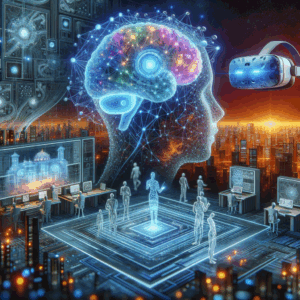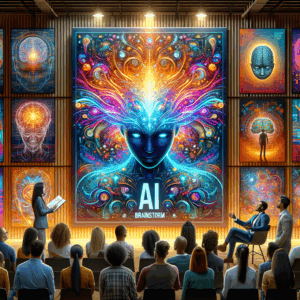
AI-Generated Branding: Stunning Solutions For Startups
- Understanding AI-Generated Branding
- How AI Works in Branding
- The Key Elements of Branding
- Visual Identity
- Messaging
- Consistency
- Emotional Resonance
- Popular AI Branding Tools for Startups
- Choosing the Right Tool
- The Impact of AI on Brand Perception
- Personalization
- Engagement
- Predictive Analysis
- Building Trust
- Challenges Faced in AI-Generated Branding
- Over-Reliance on AI
- Miscommunication of Brand Values
- Data Privacy Concerns
- Crafting Your Brand Strategy with AI
- Define Your Brand Identity
- Collaborate with Creativity
- Test and Iterate
- Keep Updated
- Real-Life Examples of AI-Generated Branding
- Logo Design: Wix Logo Maker
- Tagline Creation: Copy.ai
- Visual Branding: Looka
- Future of AI-Generated Branding
- FAQs
- What is AI-generated branding?
- How does AI contribute to branding for startups?
- What are some popular AI branding tools?
- Can startups use AI without sacrificing creativity?
- Are AI branding tools expensive?
- How can AI help with customer engagement?
- Is data privacy a concern with AI branding?
- How can startups test their branding elements?
- What happens if AI-generated content doesn't match my brand values?
- Will AI branding evolve in the future?
- References
Understanding AI-Generated Branding
The world of branding has undergone a significant transformation with the advent of artificial intelligence (AI). Startups aiming to carve their niche in competitive markets can leverage AI-generated branding solutions to stand out. By harnessing advanced algorithms, these tools create compelling visuals, logos, and taglines that resonate with target audiences.
AI branding solutions save time and resources. Traditionally, branding required extensive research, brainstorming, and revisions, which can be daunting for new businesses. Now, startups can use AI to simplify this process. It enables quicker creation while maintaining quality—essential for gaining early traction.
How AI Works in Branding
AI uses data and machine learning to analyze existing branding trends. By assessing logos, color schemes, and messaging, it identifies what resonates with audiences. This data-driven approach leads to branding that is not just aesthetically pleasing but also strategically sound.
For instance, AI can analyze customer demographics to suggest colors that evoke specific emotions. Moreover, it can generate variations of logo designs, offering numerous options quickly. Benefits of this technology include:
– Speed: AI tools can produce branding materials in minutes.
– Cost-Effectiveness: Startups can allocate budget wisely, avoiding high agency fees.
– Customization: AI tailors branding to match specific audience preferences.
The Key Elements of Branding
Branding isn’t just about visuals. It includes several key components that create a coherent identity. Startups must focus on these essential elements:
Visual Identity
Your logo, color palette, and typography form the visual identity. AI tools can create stunning logos based on user inputs and market analysis. A well-designed logo tells your brand’s story at a glance.
Messaging
Messaging involves your brand’s voice and tone. AI can analyze successful messaging strategies from competitors and help craft compelling taglines. This alignment with audience expectations is crucial for establishing trust.
Consistency
Consistency strengthens brand recognition. AI can automate social media posts, ensuring uniformity in tone and visuals. This allows startups to maintain a cohesive brand experience across platforms.
Emotional Resonance
Through data analysis, AI identifies emotional triggers for various audiences. Properly utilized, it can guide the creation of branding elements that connect with consumers on a deeper level. Connecting emotionally boosts customer loyalty.
Popular AI Branding Tools for Startups
Several AI branding tools have gained popularity due to their effectiveness and ease of use. Here’s a breakdown:
| Tool Name | Primary Function | Price Range |
|——————–|——————————————-|———————|
| Looka | Logo design and brand kit creation | $20 – $80+ |
| Canva | Graphic design and social media posts | Free – $12.99/month |
| Brandmark | Logo creation and design suggestions | Starting at $25 |
| Tailor Brands | Full branding suite, including logos | $3.99/month |
| Hatchful | Logo maker and customization tool | Free |
Choosing the Right Tool
Your choice of tool depends on your specific needs and budget. For instance, if your priority is a logo, Looka or Brandmark can deliver high-quality results quickly. For a more comprehensive branding solution, Tailor Brands offers an entire suite.
Additionally, consider user-friendliness and customer support. Many of these tools have intuitive interfaces, but it’s wise to check if they offer resources or tutorials.
The Impact of AI on Brand Perception
The way consumers perceive a brand can significantly influence its success. AI plays a vital role in shaping perceptions through targeted and personalized experiences. Leveraging AI can yield many advantages for startups:
Personalization
Consumers appreciate personalized experiences. AI analyzes consumer behaviors to tailor brand interactions. Examples include personalized emails, targeted ads, and customized product recommendations. When consumers feel understood, they’re more likely to engage.
Engagement
AI tools can monitor social media sentiment, allowing your brand to react swiftly. Whether addressing customer complaints or engaging with positive feedback, timely responses foster loyalty. Brands that demonstrate responsiveness tend to cultivate a dedicated following.
Predictive Analysis
Using predictive analytics, AI can forecast future branding trends. This gives startups a competitive edge, as they can adapt their branding strategies proactively. By staying ahead of trends, your startup can avoid obsolescence.
Building Trust
A transparent and responsive AI-driven branding strategy builds trust. Customers feel secure knowing a brand understands their needs and preferences. This trust enhances customer loyalty, driving repeat business.
Challenges Faced in AI-Generated Branding
Despite the numerous benefits, startups may encounter challenges when using AI for branding. Identifying these obstacles is crucial for effective navigation.
Over-Reliance on AI
While AI offers valuable insights, creativity remains a human-centric skill. Relying solely on AI for branding can lead to a sterile approach. Always blend AI outputs with human creativity to add a personal touch.
Miscommunication of Brand Values
AI may not fully grasp your startup’s core values or story. In some cases, the generated content could miss the mark. Regularly review AI-generated outputs to ensure they align with your brand identity.
Data Privacy Concerns
With AI tools gathering data, startups must prioritize data privacy. Consumers are increasingly cautious about how their data is used. Implementing robust privacy policies can help mitigate concerns and foster trust.
Crafting Your Brand Strategy with AI
A solid branding strategy combines AI insights with a clear vision. Here’s how startups can effectively craft their branding strategy using AI:
Define Your Brand Identity
Start by establishing your brand’s core values and mission. Define what sets you apart from competitors. Use AI tools to visualize these attributes through logos and designs that resonate with your target audience.
Collaborate with Creativity
Incorporate human creativity and intuition into the AI-generated designs. While AI can create fantastic visuals, human insight adds context. Regular team brainstorming sessions can provide valuable perspectives.
Test and Iterate
Branding is an ongoing process. Run A/B tests with different branding elements to assess what works best. Collect feedback from users and adjust based on their responses. AI can assist by analyzing the data collected during these tests.
Keep Updated
Branding trends evolve. Stay updated on new AI tools and techniques. Regularly review and refine your branding strategy to keep it fresh and relevant. This adaptability ensures long-term success.
Real-Life Examples of AI-Generated Branding
Several startups have successfully harnessed AI for their branding needs. Here are some notable examples:
Logo Design: Wix Logo Maker
Wix, known for website building, introduced the Wix Logo Maker. This tool allows users to create unique logos quickly. After entering preferences and styles, the AI generates logos, providing a base for further customization.
Tagline Creation: Copy.ai
Copy.ai offers automated tagline generation among other content solutions. Startups input their business details, and the AI generates catchy taglines that align with their mission. This feature alleviates the pressure of creating something captivating from scratch.
Visual Branding: Looka
Looka not only generates logos but also creates full brand kits. Startups can establish a cohesive brand identity by garnering color palettes and typography suggestions that work well together. This ensures visual consistency across all platforms.
Future of AI-Generated Branding
As technology evolves, so does the landscape of AI-generated branding. Emerging technologies, like augmented reality (AR) and virtual reality (VR), promise to augment branding efforts. AI-powered AR tools can help startups visualize products in immersive environments, enhancing customer experiences.
Moreover, alongside AI’s growth, ethical considerations will also play a critical role. Educating startups on responsible data usage and transparency will become paramount. The intersection of ethics and AI branding strategies will shape brand-customer relationships in the future.
Emerging tools will likely integrate advanced features, such as multi-language support, making branding accessible to a broader audience. Startups can leverage these advancements to create global brands without language barriers.
FAQs
What is AI-generated branding?
AI-generated branding utilizes artificial intelligence to create branding elements like logos, taglines, and social media posts efficiently.
How does AI contribute to branding for startups?
AI analyzes existing branding trends to recommend designs, colors, and messaging that resonate with specific target audiences.
What are some popular AI branding tools?
Popular tools include Looka, Canva, Brandmark, Tailor Brands, and Hatchful, each offering unique features for branding.
Can startups use AI without sacrificing creativity?
Yes, blending AI-generated outputs with human creativity can yield the best results. Creatives should guide AI to maintain a unique voice.
Are AI branding tools expensive?
Pricing varies widely among tools. Some, like Hatchful, are free, while others, like Tailor Brands, operate on subscription models.
How can AI help with customer engagement?
AI tools analyze customer interactions, enabling brands to respond promptly, personalize experiences, and foster loyalty.
Is data privacy a concern with AI branding?
Yes, startups must prioritize data privacy by implementing robust policies to manage the information gathered through AI tools.
How can startups test their branding elements?
Running A/B tests and collecting user feedback can help assess the effectiveness of branding elements, guiding future adjustments.
What happens if AI-generated content doesn’t match my brand values?
Regularly reviewing AI-generated content ensures alignment with core brand values. Adjustments can be made as necessary to maintain consistency.
Will AI branding evolve in the future?
Yes, as technology progresses, AI branding will incorporate new features and ethical considerations, making branding more effective and accessible.
References
1. Looka
2. Canva
3. Brandmark
4. Tailor Brands
5. Hatchful
6. Copy.ai
7. Wix Logo Maker
By mastering AI-generated branding, startups can carve out their unique identities and thrive in competitive landscapes. Embrace the tools at your disposal and make the most of this remarkable technological advancement.

